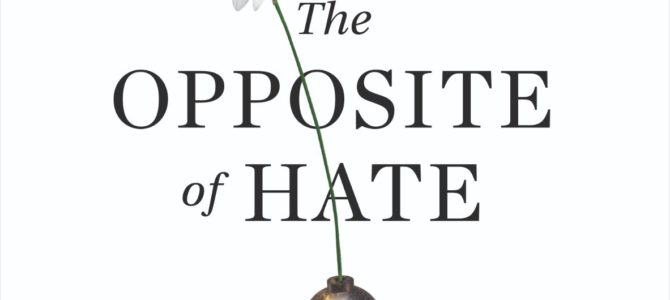
Sally Kohn and I are very similar in some ways. We are around the same age, we are both married, gay, and Jewish. We both come from an activist background in left-wing politics and engage in political commentary today. We both experience the extreme end of hateful personal attacks from people online who only know us by our work but not as people. We mutually wish for civil discussion in the political sphere and feel a growing sense of concern for the hostility we see around us. But we view the way the world works very differently.
Sally is an interesting person in that she does not fit the stereotype of what I have come to embrace as “liberal.” To begin with, she never blocked me after a challenge to her arguments or statements as many others on the Left, especially in the LGBT media, have. In fact, she follows me on Twitter.
Sally has always been a go-to example of left-wing insanity for me, but that image was challenged in late 2016 when I saw her interview with Steven Crowder on Islam and progressivism. To my surprise, I found her engaging, funny, and likable. More importantly, I recognized a willingness to discuss controversial topics in a friendly way that I find in my beloved, and highly progressive, rabbi. I did not expect that based on the tweets I had seen from her over the years. In our recent interactions, I have found her to validate that image.
I bought her debut book, The Opposite of Hate: A Field Guide to Repairing Our Humanity, in an attempt to test out what I would later discover to be her version of ‘Connection Speech.’ I wanted to see what she had to say. I both listened to the audio version and read the book and found her writing style and presentation inviting and disarming. Political commentary is a harsh world filled with rhetoric and posturing, and in many ways we all allow ourselves more room for sharpness than we might in regular life. I know I certainly do.
Two Views On Inequality
The book is essentially a breakdown of differing levels of hatred as seen by progressive ideology. It ranges from Sally’s personal experience bullying a peer as a child to Islamic extremism, white supremacy, and genocide. In what may surprise conservative readers, she specifically cites hatred expressed by the whole spectrum of political discourse and religious and social conflict, although she lingers on the more recognizable manifestations of early twentieth-century racism.
In each scenario she positions herself and her experience into the narrative in an attempt to understand what the other person is experiencing. She does this with a moving story about a former Palestinian terrorist, and conversations with individuals who have devoted an inordinate amount of time to harassing her online. Arguments based on moral relativism are nothing new to the Left, and the Right often sharply opposes them, but she presents these positions reasonably.
One major area of difference between our two philosophies is in understanding the timeline of humanity. Conservatives tend to view history as a series of episodes that influence successive generations but can also have cultural and political elements that are unique to a particular time.
Progressives, on the other hand, see history as a continuous string of causation. Conservatives have a tendency to see individuals as making their own decisions in their own time with the resources and knowledge available resulting in collective influence. Progressives tend to see things the other way around, with society moving as a collective and consequences felt at the individual level. This is one primary reason people on the Right become frustrated by the Left continually dredging up the past when we do not feel it is relevant.
Sally argues, for example, that racial and income inequality between white and black families comes from past advantage and disadvantage that predetermined the trajectory of experience. In her view, slavery, segregation, and discrimination directly affect the modern individual experience of both groups. If you view history as a continuous domino effect, progressive ideas about privilege, bias, and institutional racism and sexism tend to dominate the discussion. If you view each generation as being responsible for its own actions, beliefs, and outcomes, while they may be significantly influenced by the past, they are not pre-ordained.
While Sally recognizes that everyone, including herself, experiences prejudice and bias, the implicit understanding is that due to the historical advantage white Americans have enjoyed at the expense of all other minority groups, the consequences of that prejudice cannot be equally compared. Conservatives, including myself, disagree that a person’s minority status immunizes him or her from taking responsibility for his or her own hatred, bigotry, or prejudice. Bias does exist, but conservatives tend to view it in terms of culture or individuality rather than being inimical to overbroad categories such as race. We both recognize the bias is there, we just disagree on its origin or inspiration. We see the same truth through different lenses.
Progressives think in very large terms, attempting to make sense of every aspect of humanity down to the smallest detail and to force it all into a pre-designed narrative. They fundamentally believe humanity can be studied and perfected and all things can be explained with the right social theory. We reject concepts like institutional racism, white supremacy, and colonialism because we do not view humanity as a single experience, but rather many experiences with their own unique circumstances and environmental factors. The Left tends to assign a universal emotion or motivation onto historical groups based on modern understandings, whereas the Right prefers to view those peoples within the context of the time and place they lived.
In studying hatred from a progressive assumption, Sally helps explain a great deal in the thinking patterns behind modern left-wing slogans, outrage, and messaging. But she explains much more deeply the imperative of trying to find a way to resolve this impulse in humanity. Whereas I, as a conservative, would advocate individual responsibility in one’s own words, beliefs, and actions, Sally feels the solution must rely on some form of collective recognition of human compassion.
In this, I do not disagree with her. In every example she presents, from white supremacists to Islamic terrorists to Palestinian hostility to her own implicit sense of bias, she tells the story of a human trying to understand the world from her own unique position in it. While I do not agree with much of the reasoning behind her conclusions, I sympathize with her intent.
Opening Discussion
I came away from this book feeling a sense of curious happiness. I still do not feel Kohn fully understands what I would think or feel as a conservative, but I believe she is willing to, at the very least, try. We often assume the purpose of political discourse is to convert the other side. With enough evidence, passion, or argument we hope to change the mind of the other person. We all tend to find ourselves frustrated by the failure of that ambition.
The solution is not found in embracing one another’s worldviews. That simply isn’t possible. For me to meet Sally where she is, I would have to rebuild my entire concept of humanity, and so would she if she met me where I am. But that isn’t the point. The idea is not to pretend that our political differences do not separate us, but we can recognize the value of civil discussion despite these differences. The goal, as far as I am concerned, is the open discussion of ideas.
This book provides a healthy outlet to begin that discussion. Although it is unlikely conservatives will recognize themselves within the text, I am hopeful progressives can be recognized with a little more humanity. If I offered a criticism, it would be a lack of recognition of current hate the mainstream Left—in media, political activism and entertainment—openly expresses towards average Americans far too easily labeled as “dangerous” or “bigots.” Although, to her credit, early on in the book Kohn explores examples of hatred expressed by “both sides,” citing several high-profile liberal examples, even denouncing direct hatred towards President Trump.
Still, I feel she has a blind spot towards the growing acceptance of hateful expression towards conservatives that would clearly be viewed as unacceptable when the situation is reversed. Despite this, I think when a person attempts to understand who we are in an honest way, we should listen and accept their efforts. In this case, I believe Sally meets that criteria and I would recommend giving this book a read or — my preference — a listen to.
This book was refreshingly non-combative. Rather than a laundry list of right-wing offenses detailed in self-righteous indignation with hectoring morality sprinkled throughout, the book was simply exploratory and informative. Sally has a talent for writing in a way that speaks directly to you and challenges your instinct to remain objectively distant when the topic turns to ideas you already know you disagree with. You probably still won’t agree with what she says, but I think you’ll agree it’s nice she is opening up the discussion in the first place.









